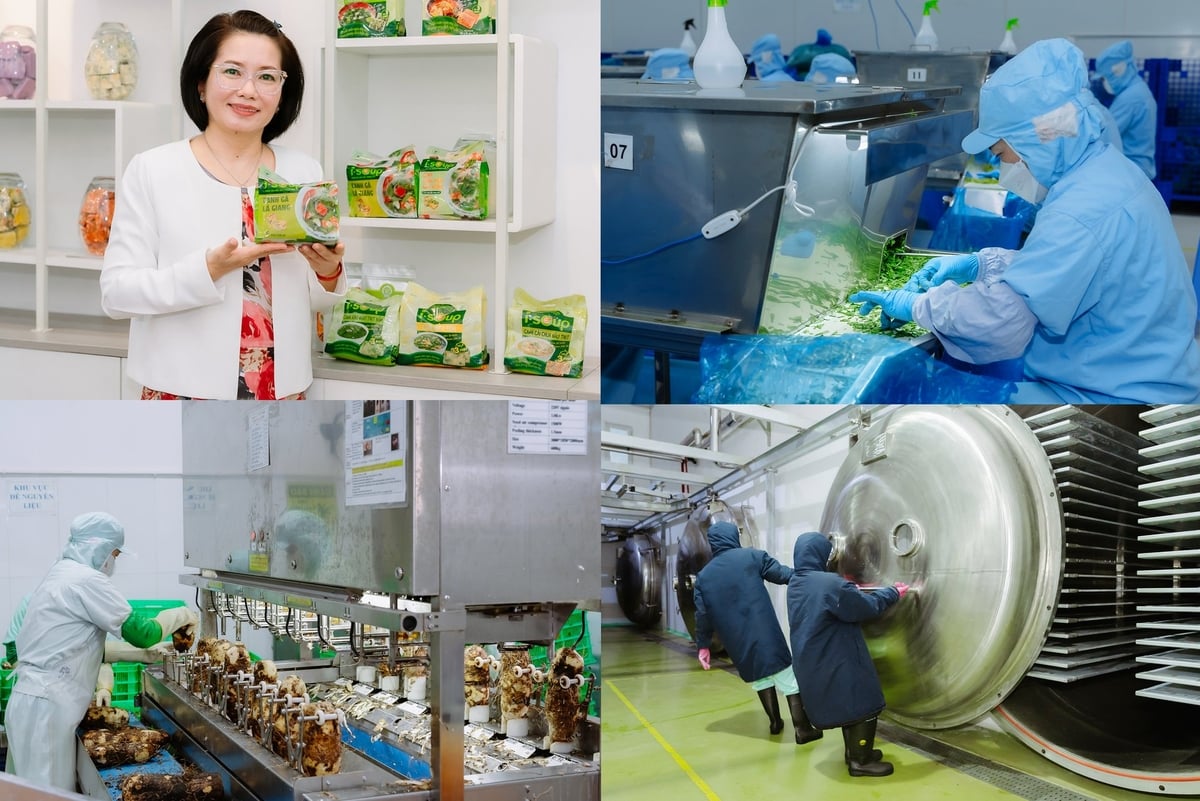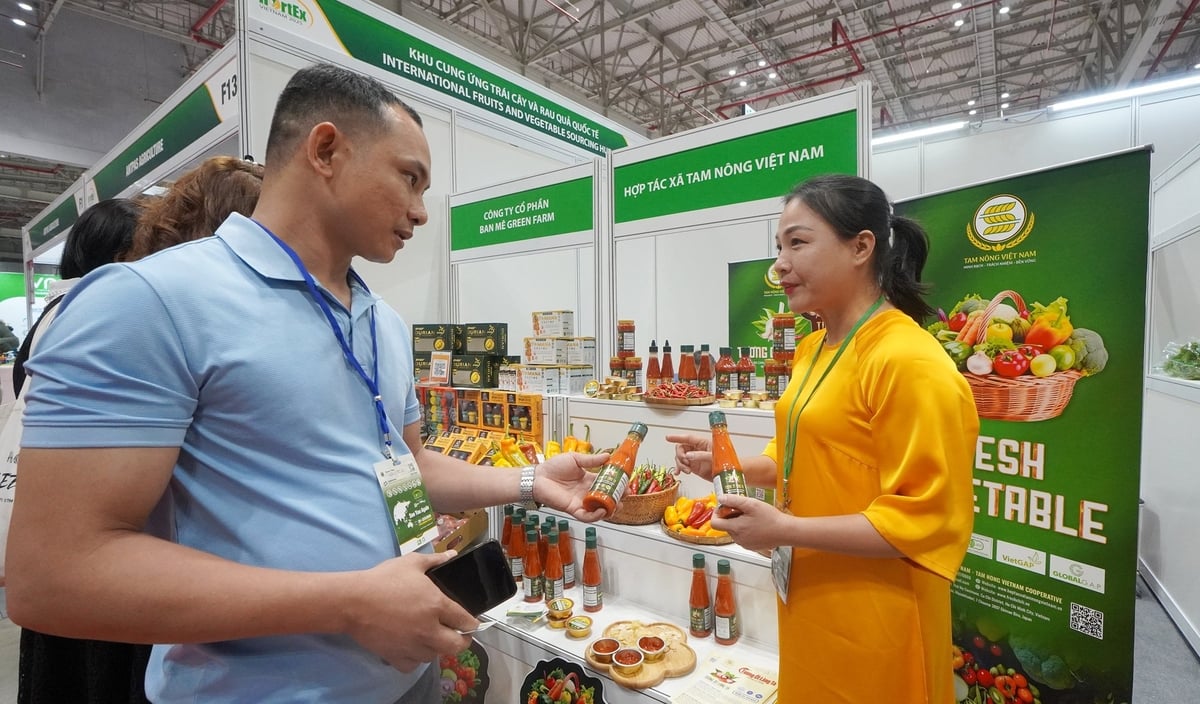November 19, 2025 | 18:18 GMT +7
November 19, 2025 | 18:18 GMT +7
Hotline: 0913.378.918
November 19, 2025 | 18:18 GMT +7
Hotline: 0913.378.918
In the context of consumers increasingly focusing on safe food with clear origins, organic farming and clean agriculture models combined with deep processing are opening new pathways for Vietnamese agricultural products. These approaches not only help avoid the situation of "good harvests, low prices" but also allow products to reach the global market with Vietnamese brands.

NFC has invested over 1 million USD in freeze-drying technology. Photo: Nguyen Thuy.
With the knowledge gained during her training in Japan, Mrs. Tran Thi Kieu Huong, Director of Market Research and Development at NFC Food Co., Ltd., has invested over 1 million USD in freeze-drying technology. Along with her team, the company has been a pioneer in introducing this technology to Vietnam since 2014, aiming to enhance the value of agricultural products.
Freeze-drying is a process that involves drying at deep negative temperatures under vacuum pressure, allowing products to maintain their shape, color, nutritional value, and flavor. With this technology, NFC produces instant soups that only require 3 minutes of preparation with hot water, delivering the authentic taste of home. It also produces freeze-dried vegetables and fruits under brands like NATAS, I.SOUP, and I.YAUA. These products are not only convenient but also preserve the true flavors of the ingredients.
According to Mrs. Tran Thi Kieu Huong, the company’s instant soups made from vegetables have gained a warm reception among the Vietnamese community abroad.
"Previously, heat was mainly used for drying. This method often causes products to undergo changes, losing their quality and visual appeal. Agricultural products, especially organic ones, are very sensitive to time and easily deteriorate. However, when deep processing technology is applied, it helps maintain the product's quality and preserves its essence. When the product is rehydrated, it tastes as fresh as new, can be stored for long periods, and is transportable over long distances, thereby increasing its value," said Mrs. Tran Thi Kieu Huong.
NFC is not only a key supplier for major companies like Masan, Unilever, and Ajinomoto, but also exports products to demanding markets such as the U.S., Japan, South Korea, Australia, the Philippines, and Indonesia. This is clear evidence of the company's ability to produce standardized, high-quality products and meet the global requirements for Vietnamese agricultural goods when deep processing technology is applied.
"This year, we will participate in the Anugar 2025 Food and Beverage Fair in Germany to expand into the European market. Additionally, we will support our distributors in strengthening the Canadian market, especially in areas with Vietnamese communities," said Mrs. Tran Thi Kieu Huong.
To secure a stable supply of raw materials, NFC has invested in two organic farms, one in Long An (30 hectares) and one in Dak Nong (10 hectares). This long-term strategy aims to meet the stringent demands of markets like Europe, where there are strict regulations regarding pesticide residues.

Tam Nong Vietnam Cooperative sets its sights on expanding exports to demanding international markets. Photo: Nguyen Thuy.
Chili peppers are famously “difficult” to grow, yet Tam Nong Vietnam Cooperative (located in Cu Chi District, Ho Chi Minh City) chose them as the centerpiece of its organic farming journey, marking the beginning of a bold vision to reach global markets. By strictly adhering to a meticulous process, from seed selection and soil rehabilitation to pest control, while completely avoiding chemical fertilizers, pesticides, and genetically modified seeds, the cooperative has successfully cultivated clean, high-quality chili peppers.
“Agricultural production is not just about selling products; it's also about protecting the soil and preserving a healthy living environment for farmers and the wider community.
We pursue organic agriculture not because it’s a trend, but because it represents a civilized lifestyle, one that is in harmony with nature, crucial in the context of worsening climate change and environmental pollution,” said Nguyen Thi Van Anh, Director of Tam Nong Vietnam Cooperative.
Beyond developing quality products, the cooperative is empowering farmers to take control of their lives through an agricultural economic mindset, turning farming into a sustainable livelihood and a meaningful way to protect the planet.
Not stopping at production, Tam Nong Vietnam Cooperative proactively trains farmers in organic farming knowledge. The cooperative teaches how to make organic compost from agricultural waste and how to use biological antagonists to control pests naturally. At the same time, it guarantees product purchases at prices higher than the market average, building strong trust and creating a ripple effect within the farming community.
The plump, fiery red chili peppers are carefully selected and naturally fermented, free from preservatives and artificial coloring. These are the foundation of "Tuong Ot Lang Ta", a product that retains its bold spiciness while capturing the traditional Vietnamese flavor. This authentic, clean-label chili sauce is now poised to win over international markets, showcasing the potential of Vietnamese agriculture when rooted in quality, tradition, and sustainable practices.
“We believe that when Vietnamese agricultural products have genuine quality, transparent stories, and responsible production, no market is too difficult to conquer,” Mrs. Van Anh confidently affirmed.
“Post-harvest is the moment when the true value of agricultural products is determined. Without processing, they remain merely raw materials,” Mrs. Van Anh shared.
Thanks to a standardized fermentation process and a closed-loop production system, Tam Nong Vietnam Cooperative’s “Tuong Ot Lang Ta” chili sauce has successfully overcome technical barriers to enter the Japanese market, one of the world’s most demanding markets.
“We strictly adhere to the philosophy of transparency, responsibility, and sustainability in every step of our process. Packaging must be recyclable, production must be emission-free, and the product must meet high-quality standards while respecting the environment,” said Mrs. Van Anh.
She also shared that the cooperative continues to expand its scale by actively participating in domestic and foreign trade fairs to connect with the market. At the same time, it is strategically investing in two core products: chili and rice, with the ambition of turning the “Lang Ta” brand into a symbol of Vietnamese organic agriculture.
Going even further, to create a dedicated space for standardized Vietnamese products in the Japanese market and support other businesses with the same vision, Mrs. Nguyen Thi Van Anh established “TB Market” in Hokkaido, Japan.
Built on a scientific foundation, deep processing technology, and a long-term strategy, Tam Nong Vietnam Cooperative aims to diversify its product offerings through innovation, strict production standards, and transparency. With this approach, the cooperative is steadily affirming the national status of its agricultural products and paving the way for Vietnamese produce to reach global markets, bringing high-quality, authentic products from Vietnam to consumers around the world.
Translated by Phuong Linh

(VAN) Viet Nam’s entry into the ACF Alliance expands opportunities for agricultural innovation, knowledge exchange, and deeper international cooperation.

(VAN) Vietnam remains committed to sustainable development, maintaining a harmonious balance among economic growth, environmental protection, and climate-change response.

(VAN) Deputy Prime Minister Tran Hong Ha convened a meeting with the MAE and relevant agencies to discuss the draft decree on national multidimensional poverty standards for the 2026 - 2030 period.

(VAN) The year 2025 marks the 10th anniversary since more than 190 countries adopted the Paris Agreement on climate change, paving the way for strengthened global action.

(VAN) The PepsiCo Foundation funded the project ‘New Harvest: Sustainable Agriculture Initiative’, focusing on regenerative agriculture and climate change.

(VAN) Dr. Nguyen Viet Hung, ILRI's Regional Director for Asia, emphasized the One Health approach in ensuring food safety and reducing antimicrobial resistance risks in livestock.

(VAN) The youth-driven initiative ‘Innovate for water, act for the future’ seeks practical, scalable solutions to Vietnam’s water challenges.